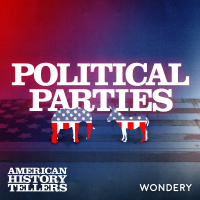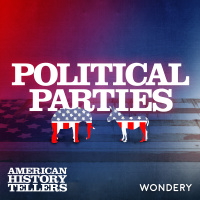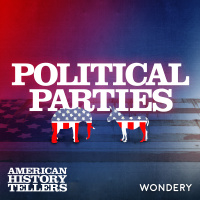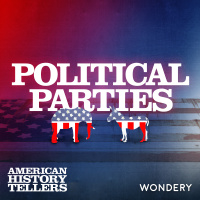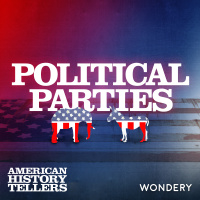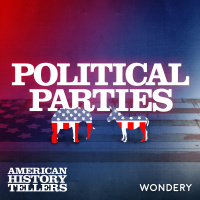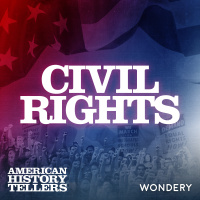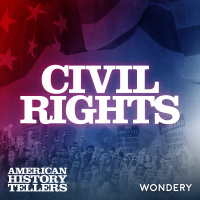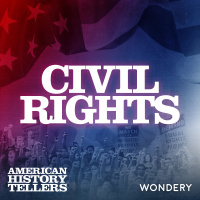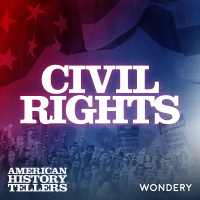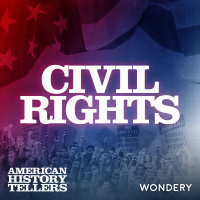Sinopsis
The words you speak. The ideas you share. The freedoms you defend. Every part of your life can be traced to our shared history, but how well do you really know the stories that made America? We’ll take you to the events, the times and the people that shaped our nation and Americans. And we’ll show you how our history affected them, their families and affects you today. Hosted by Lindsay Graham. From Wondery, the network behind Tides Of History, History Unplugged, Fall Of Rome and Dirty John.
Episodios
-
Political Parties - The Reagan Revolution | 6
26/12/2018 Duración: 48minThe year 1968 marked a watershed in American politics. Anti-war protests were roiling the country. Civil rights leader Martin Luther King Jr. was shot dead in Memphis. Democratic President Lyndon Johnson’s approval rating was plummeting. The assassination of Democratic presidential hopeful Robert Kennedy would throw the party into disarray, toppling the New Deal coalition built by Franklin Delano Roosevelt two generations earlier and leading to a conservative surge.The political sea change would drive Republican nominee Richard Nixon to the White House in 1968. And it would eventually elect a former actor and California governor who would change the face of American politics in ways that are still being felt to this day. His name was Ronald Reagan.Support us by supporting our sponsors!See Privacy Policy at https://art19.com/privacy and California Privacy Notice at https://art19.com/privacy#do-not-sell-my-info.
-
Political Parties - The New Deal Coalition | 5
19/12/2018 Duración: 44minThe 1929 stock market crash saw 14 billion dollars vanish in a matter of hours — and with it, the Republican party’s decades-long grip on American politics. As Americans lost their livelihoods, they turned to President Herbert Hoover for relief. But the self-made man who had so successfully reversed his own fortunes seemed unable to do the same for his country. With discontent growing, Hoover turned on World War veterans demanding early bonus payouts to support their families. It would prove the last straw for many Americans.The landslide election of 1932 would mark a profound realignment in U.S. politics, bringing urban centers under Democratic control for the first time in the party’s history. And it would propel into the White House Franklin Delano Roosevelt, whose sweeping New Deal would permanently transform the American political landscape.Support this show by supporting our sponsors!See Privacy Policy at https://art19.com/privacy and California Privacy Notice at https://art19.com/privacy#do-not-sell-my
-
Political Parties - The Golden Age of the GOP | 4
12/12/2018 Duración: 47minAs the Civil War came to a close, the government set its sights once again on the future of the United States. Working closely with a Republican President, the Republican Congress expected a swift and peaceful road to Reconstruction. But then, a mere four weeks into his second term, Lincoln was assassinated, leaving the country in the hands of Andrew Johnson, a Southern Democrat who had personally owned slaves just three years before.While Johnson’s unwavering commitment to states rights cultivated a fraught relationship with his Congress, the tumult would ultimately be short-lived. After just four years of a Democratic president, America’s Grand Old Party would ascend to power—and hold it—for over 70 years.Support this show by supporting our sponsors!See Privacy Policy at https://art19.com/privacy and California Privacy Notice at https://art19.com/privacy#do-not-sell-my-info.
-
Political Parties - The Turbulent 1850s | 3
05/12/2018 Duración: 43minThe United States won the The Mexican–American War in the 1840s, and with it vast new stretches of western land. But in the 1850s, the question of what to do with this land – and whether to allow slavery in the new territories or not – became a redning issue for politicians of all stripes.While the Whig Party collapsed over the issue, Democrats split into Northern and Southern factions, and a new Republican Party tried to bind the Union with an appeal to old Jeffersonian values. But in the houses of Congress and across the nation, negotiations fail, compromise is abandoned; and the issue of slavery will overshadow all else, leading to Civil War.Support this show by supporting our sponsors!See Privacy Policy at https://art19.com/privacy and California Privacy Notice at https://art19.com/privacy#do-not-sell-my-info.
-
Political Parties - Jacksonian Democracy | 2
28/11/2018 Duración: 46minAndrew Jackson lost the 1824 presidential election to John Quincy Adams through what some called a “corrupt bargain” in the House of Representatives. The maneuver was masterminded by hot-headed but politically savvy Henry Clay, who with Adams, announced their intent for far-reaching new federal programs. Fierce opposition to these policies united pro-Jackson supporters who formed a new party, the Democrats, to rally around their hero and elect him to president in 1828.But while Adams was defeated, Henry Clay had no intention of leaving the fight. He helped lead a new party which gathered together anti-Jackson, fiscal conservatives, and pro-states rights factions. The rise of Clay’s new Whig party seemed unstoppable–they captured both houses of Congress and the presidency–until, on April 4, 1841, president William Henry Harrison died in office and gave John Tyler the power of the veto.Support this show by supporting our sponsors!See Privacy Policy at https://art19.com/privacy and California Privacy Notice at h
-
Political Parties - A Tale of Two Parties | 1
21/11/2018 Duración: 45minIn the earliest days of the United States, there was no such thing as an organized political party. George Washington, elected twice to the presidency unanimously in the Electoral College, warned the new nation against political factions, writing that organized parties would become, “potent engines, by which cunning, ambitious, and unprincipled men subvert the power of the people.”But immediately after Washington vacated the Presidency, factions did spring up and bitter personal rivalries began to shape the nation. The two first political parties–the Federalists and the Republicans–had very different views of what America should become, and were led by very different men: Alexander Hamilton and Thomas Jefferson.Support us by supporting our sponsors!See Privacy Policy at https://art19.com/privacy and California Privacy Notice at https://art19.com/privacy#do-not-sell-my-info.
-
History of the Lincoln Motor Company
20/11/2018 Duración: 24minNamed after one of the greatest U.S. presidents, the Lincoln Motor Company has become as ingrained in American culture as the Statue of Liberty. Founded by Henry Leland to produce plane engines during World War I, Lincoln became a key driver of the early automobile industry in the United States and a pioneer of the luxury car market. But when Leland’s vision proved too ambitious for the nascent American car market, Lincoln was purchased by the Ford Motor Company.The Ford acquisition would prove to be a game-changer for Lincoln. It provided the young company with a jolt of capital, marketing know-how, and a secret weapon: Henry Ford’s son, Edsel Ford, who possessed an uncanny sense of style and what customers wanted. He would lead the Lincoln to build an entirely new class of automobile: something “strictly continental.” Brought to you by the 2019 Lincoln MKC.See Privacy Policy at https://art19.com/privacy and California Privacy Notice at https://art19.com/privacy#do-not-sell-my-info.
-
Civil Rights - Interview with Peggy Trotter Dammond Preacely | 7
14/11/2018 Duración: 38minWe conclude our series on the American Civil Right Movement with an interview with a woman who was there, on the front lines of the fight.Peggy Trotter Dammond Preacely is longtime civil rights activist and artist. She was a Freedom Rider, boarding busses to travel the south in a fight for desegregation, and member of the Student Nonviolent Coordinating Committee, participating in sit-ins, marches, and voter registration campaigns. She marched on Washington, was arrested three times, was visited in jail by Martin Luther King Jr., and leads a life defined by her heritage, commitment to nonviolent activism, and the hope for continued change.You can read Peggy's poem here.Support this show by supporting our sponsors!See Privacy Policy at https://art19.com/privacy and California Privacy Notice at https://art19.com/privacy#do-not-sell-my-info.
-
Civil Rights - The Unfinished Journey | 6
07/11/2018 Duración: 43minSeeking to build upon the gains of the early 1960s, Civil Rights activists pushed forward on a series of ambitious efforts. Voting rights activists returned to Alabama and again faced violent reprisal—this time televised for the country to witness. A shocked nation watched the violence in Selma in horror; Congress took action, passing the Voting Rights Act.Off of this success, Martin Luther King Jr. began building a coalition of activist groups to turn the nation’s attention to the fight against poverty. Gathering support for a massive march on Washington, Dr. King visited Memphis, hopeful and in high spirits. He did not leave alive.“America does move forward and the bell of freedom rings out a little louder. We have come some of the way, not near all of it. There is much yet to do.” President Lyndon B. JohnsonSupport this show by supporting our sponsors!See Privacy Policy at https://art19.com/privacy and California Privacy Notice at https://art19.com/privacy#do-not-sell-my-info.
-
Civil Rights - On The March | 5
31/10/2018 Duración: 46minAs the Civil Rights movement entered the landmark years of 1963 and 1964, activists had faced many challenges - but had also won many victories. Now, they sought to launch new campaigns in Alabama and Mississippi and mass demonstrations in Washington D.C. and New York City. In the span of sixteen remarkable months, the movement and the nation itself would be transformed, walking the razor’s edge between triumph and tragedy.Support us by supporting our sponsors!See Privacy Policy at https://art19.com/privacy and California Privacy Notice at https://art19.com/privacy#do-not-sell-my-info.
-
Civil Rights - Prairie Fire | 4
24/10/2018 Duración: 38minAs the Civil Rights movement entered the Sixties, a new generation of activists took the fore. Frustrated by the pace of progress but emboldened by strides made in the previous decade, students embraced “nonviolent direct action,” protest techniques that were provocative but peaceful. Soon, a wave of sit-ins hit lunch counters across the South. The response was caustic, often violent; but the protesters’ persistence led to negotiations with business owners and civil authorities that led to successful desegregation.The next wave of direct action - the Freedom Rides - met much worse and more violent resistance. Protesters were beaten, busses burned, and hope was nearly lost. Then, when activists moved into the rural South to organize the black vote, white supremacists’ ire turned murderous.Support us by supporting our sponsors!See Privacy Policy at https://art19.com/privacy and California Privacy Notice at https://art19.com/privacy#do-not-sell-my-info.
-
Civil Rights - Jim Crow Fights Back | 3
17/10/2018 Duración: 38minAfter the Brown V. Board of Education ruling, civil rights activists had legal standing to desegregate schools. But doing so proved dangerous. The first black students to step into newly integrated schools faced extreme hostility from whites who felt Jim Crow society was under attack.The segregationists defied federal court orders. When National Guard troops sent by President Eisenhower forced the issue, white supremacists changed tactics, patiently and cruely wielding political and economic influence against activists. And when even those measures proved not enough to stop integration, some communities abandoned public education altogether, for whites and blacks. Closing all schools, they felt, was better than integrating them.Support us by supporting our sponsors!See Privacy Policy at https://art19.com/privacy and California Privacy Notice at https://art19.com/privacy#do-not-sell-my-info.
-
Civil Rights - Strides Towards Freedom | 2
10/10/2018 Duración: 35minIn 1896, the U.S. Supreme Court ruled that segregation was legal, on a “separate but equal” basis. But for more than five decades, life for black and white Americans was seldom equal, but always separate.To fight segregation, the NAACP and others exposed the dismal and debasing conditions in black schools. They won a monumental victory in Brown v. Board of Education—but then a young boy from Chicago named Emmett Till was dredged from the swamps of Mississippi.Till’s death galvanized the movement. Listening to an activist speak about Till’s murder, one woman would rise to become the face of the fight against segregation. On a city bus in Montgomery, Alabama, Rosa Parks refused to give up her seat.Support us by supporting our sponsors!See Privacy Policy at https://art19.com/privacy and California Privacy Notice at https://art19.com/privacy#do-not-sell-my-info.
-
Civil Rights - New World A’Comin | 1
03/10/2018 Duración: 38minPresident Abraham Lincoln issued the Emancipation Proclamation on January 1, 1863, freeing the slaves in much of the South. But the road to freedom—true freedom—would take generations longer for most black Americans.In this new six-part series, we investigate their struggle, beginning in the heady post-war years of the Forties. Segregation was endemic; it was the law of the South, and the custom of the North and West. No black American escaped its demeaning and often violent grip. But in discovering the power of collective protest, civil rights activists began to make demands for basic equality in restaurants, the workplace and in schools. And as they racked up victories, excitement and determination built that this was a movement with momentum. Could they really do this? Could they make a change and finally—finally—fight off Jim Crow?Support us by supporting our sponsors!See Privacy Policy at https://art19.com/privacy and California Privacy Notice at https://art19.com/privacy#do-not-sell-my-info.
-
National Parks - Interview with Parks Superintendent Greg Dudgeon | 7
26/09/2018 Duración: 38minIn 1980, Jimmy Carter signed into law the The Alaska National Interest Lands Conservation Act, or ANILCA. That act remains controversial even today, as it set aside 43,585,000 acres of new national parklands in Alaska, including the Gates of the Arctic National Park and Preserve and the Yukon-Charley Rivers National Preserve. Superintendent Greg Dudgeon oversees both and continues to balance the mandate of the Parks’ mission with the needs of Alaskan residents.We’ll talk to Greg about his affection for the land, how Alaska captivated him early on, and the struggles of managing an area the size of Belgium, all entirely above the Arctic Circle.Support us by supporting our sponsors!See Privacy Policy at https://art19.com/privacy and California Privacy Notice at https://art19.com/privacy#do-not-sell-my-info.
-
National Parks - Fire and Ice | 6
19/09/2018 Duración: 42minAlaska: big, open, frozen and wild. In 1867, the acquisition of Alaska from the Russian Empire was widely derided as “folly.” Early explorers like John Muir saw its potential though, and clamored for its preservation in the face of increasing development and calls for statehood. But when oil is discovered, the real fight begins. Caught between angry Alaskan individualists and an ambitious federal government, the National Park Service struggles to do what’s right for the land and the people who live and depend on it.Support us by supporting our sponsors!See Privacy Policy at https://art19.com/privacy and California Privacy Notice at https://art19.com/privacy#do-not-sell-my-info.
-
National Parks - Playgrounds of the People | 5
12/09/2018 Duración: 37minIn 1914, America’s National Parks had a problem: no one was using them. And those few that were faced unmaintained roads, trails strewn with garbage, and a lack of amenities that made it hard for the average American to enjoy themselves. One man had enough, and went to Washington on a mission: establish a new National Parks Service, and transform these neglected, magic spaces into clean, approachable, fun vacation destinations.But in taking the reins, mining tycoon and marketing genius Stephen Mather would face many challenges: wolves, bears, fires, and his own internal torment.If you or someone you know is struggling with mental health, here are some additional resources:National Suicide Prevention Lifeline: 1-800-273-8255National Alliance on Mental Illness: 1-800-950-6264Crisis Text Line: Within the US, text HOME to 741741Depression and Bipolar Support Alliance: 1-800-826-3632Support us by supporting our sponsors!See Privacy Policy at https://art19.com/privacy and California Privacy Notice at https://art19.
-
National Parks - The Great Disaster | 4
05/09/2018 Duración: 40minIn the early morning hours of Wednesday, April 18, 1906, the city of San Francisco was torn apart by a huge earthquake–but it was the subsequent fires that did the most damage. As the city sought to rebuild, it also sought a more secure water supply, to break the stranglehold of a water company monopoly and insure that if fire were to strike the city again, abundant water was available to fight it.But a new reservoir would require the flooding of a treasured portion of Yosemite, the Hetch Hetchy Valley, one of John Muir’s favorite locations. He and his new Sierra Club fiercely opposed the plan. But politicians in DC and San Francisco loved it. Played out across the nation, a conflict between preservationists like Muir and conservationists like Theodore Roosevelt would ultimately decide the fate of Hetch Hetchy.Support this show by supporting our sponsors!See Privacy Policy at https://art19.com/privacy and California Privacy Notice at https://art19.com/privacy#do-not-sell-my-info.
-
National Parks - Rough Rider | 3
29/08/2018 Duración: 37minPut out to pasture, thinking his political career over, Theodore Roosevelt was atop a mountain when he heard the news: an assassin’s bullet would likely take President McKinley’s life, and make Roosevelt president.Upon his inauguration shortly after, Teddy brought his lifelong love of the natural world into the White House with him. He found his executive pen a powerful tool, setting aside vast swaths of land as preserves and monuments. And later, as he sought his first term as an elected president, he embarked on the most comprehensive tour of America’s natural wonders any president had ever made: he was struck speechless at the Grand Canyon, met naturalist John Burroughs in Yellowstone, and took “the most important camping trip in history” with John Muir in Yosemite.Support this show by supporting our sponsors!See Privacy Policy at https://art19.com/privacy and California Privacy Notice at https://art19.com/privacy#do-not-sell-my-info.
-
National Parks - Calling In The Cavalry | 2
22/08/2018 Duración: 38minYellowstone was our nation’s first national park. Its strange, wondrous landscapes were perfect for exploration - and exploitation. Upon Yellowstone’s discovery by white Americans, two races began: one to build a railroad to the park to capture its commercial potential, another to protect the land from desecration. One will fail, bringing down with it the nation’s economy. The other will require the US Army to succeed, but leave thousands of animals slaughtered and Native American tribes displaced.Support us by supporting our sponsors!See Privacy Policy at https://art19.com/privacy and California Privacy Notice at https://art19.com/privacy#do-not-sell-my-info.

